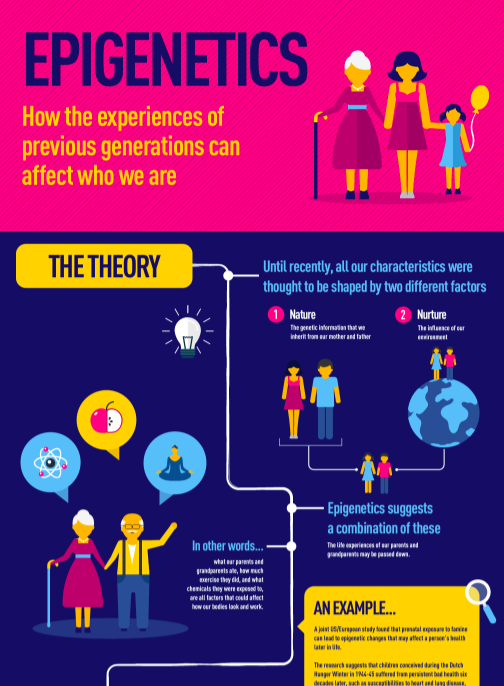
The definition of epigenetics from the CDC: The study of how your behaviors and environment can cause changes that affect the way your genes work. Unlike genetic changes, epigenetic changes are reversible and do not change your DNA sequence, but they can change how your body reads a DNA sequence.
I get on my kids for asking too many questions. I have no idea where they get it from.
I was never so annoyingly curious. I’ve never sat in line at the pharmacy drive-thru for entirely too long wondering things like:
Is it possible to know things you never learned?
What if some of my dreams are actually pieces of a memory passed down from an ancestor?
Are generational curses real?
What’s the purpose behind the feeling of déjà vu?
Can some people have premonitions or precognitions? What is different about them than others? Or does everyone have that ability, some just pay attention more than others? Is it purely intuition or being able to solve the equation/puzzle/formula before anyone else?
Is Extra Sensory Perception real?
These are my disclaimers: I am not a philosopher, neuroscientist, geneticist, or psychoanalyst. This blog post is merely for discussion purposes and contains my thoughts based on things I’ve read or listened to. So, not an expert. I do, however, want to learn more about the science and spiritual aspects of these topics! I don’t believe in past lives, crystal balls, palm reading, fortune telling, or flirt with stuff my faith would deem spiritually dangerous. Though I have been known to write a “to-do” in pen on my palm, play MASH or make a cootie catcher, eat a fortune cookie from time to time and add the words “in bed” after reading said fortune just for giggles.

Nature vs. Nurture
So obviously there are genetic traits like hair color, height, and hereditary illnesses. Those would fall into the nature category. Then there are environmental factors (nurture) within the family structure like parental or guardian behaviors, socioeconomic status, physical/emotional/mental health, conflict (or lack thereof), and other circumstances that may cause stress in some form or fashion. Community structure like school, religious organizations, neighborhoods are a factor as well.
I hear the nature vs. nurture mentioned when conversation swirls around families including step parents, step siblings, and adoptees. Interesting to think that it’s actually more of a modern idea to accept that it’s a combination of nature AND nurture. An article by David J. Lewkowicz talks about how Plato and Aristotle had “radically different answers” when it came to understanding how the “origins of human knowledge” came to be. I’ll leave you with this excerpt from his article on the two ancient philosopher’s views on this matter.

“Plato’s view spawned the rationalist school of thought whose basic tenet that all knowledge is innate was later championed by Descartes, Spinoza, Leibniz, and Kant. In contrast to Plato, Aristotle argued that our sense data are sufficient to specify abstract concepts and ideas and, therefore, that human knowledge is acquired through everyday experience.
“Aristotle’s views spawned the empiricist school of thought whose basic belief in the power of experience was subsequently championed by Locke, Berkeley, Hume, and Mill. The divergent views expressed by the rationalists and empiricists gave rise to the nature-nurture dichotomy.”
Look for Part II next week!
Don’t miss the next Get a Clue post.
Subscribe to my newsletter and get the latest article, practical
genie research hacks, updates about my book The Record Keeper, and more!


0